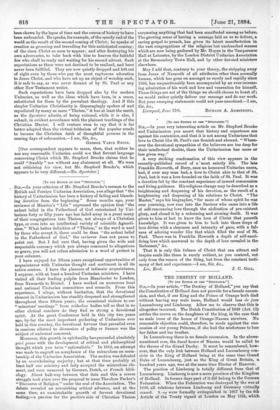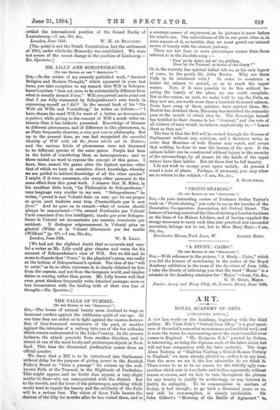THE DESTINY OF HOLLAND.
[To THE EDITOR OF THE "SPECTATOR."] SIR,—In your article, " The Destiny of Holland," you say that the Constitution of Holland does not provide for a female succes- sion, and that, if our King and the Prince of Orange both died without leaving any male issue, Holland would lose de jure Luxembourg and Limbourg. Allow me to observe that this is altogether incorrect. The Dutch Constitution of 1848 (Art. 15) settles the crown on the daughters of the king, in the case that no male issue of the house of Orange-Nassau survives. No reasonable objection could, therefore, be made against the suc- cession of our young Princess, if she had the misfortune to lose her father and her brother.
In Luxembourg there is no female succession. In the above- mentioned case, the ducal house of Nassau would be called to the throne of the Grand Duchy. It must be remembered, how- ever, that the only link between Holland and Luxembourg con- sists in the King of Holland being at the same time Grand Duke of Luxembourg, just as the King of Great Britain, a hundred years ago, was at the same time Elector of Hanover.
The position of Limbourg is totally different from that of Luxembourg. Limbourg is now a mere province of the Kingdom of Holland. In former days part of it did belong to the German Federation. When the Federation was destroyed by the war of 1866, all relations between Limbourg and Germany virtually ceased. I .:tly were formally extinguished in 1867 by the 4th Article of the Treaty signed at London on May 11th, which settled the international position of the Grand Duchy of Luxembourg.—I am, Sir, Sm.,
[The point is not the Dutch Constitution, but the settlement of 1815, under which the Monarchy was established. We were not aware of the recent change in the position of Limbourg.— ED. Spectator.]



































 Previous page
Previous page